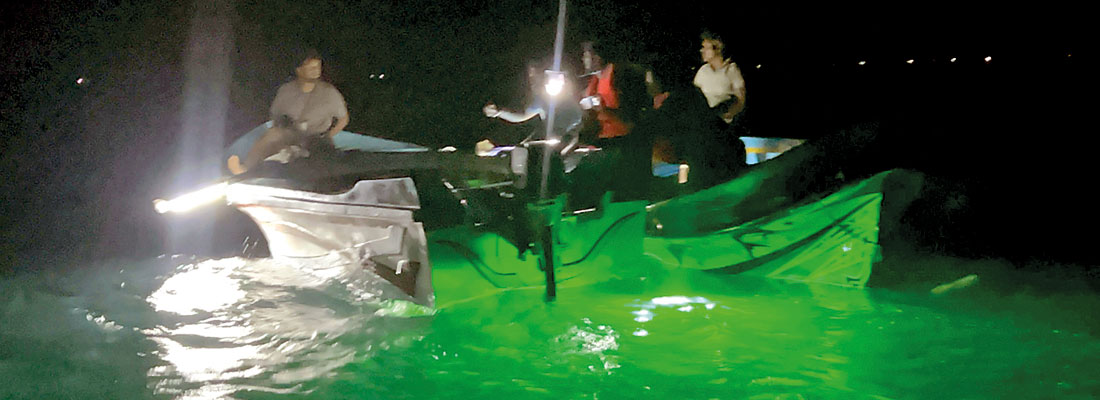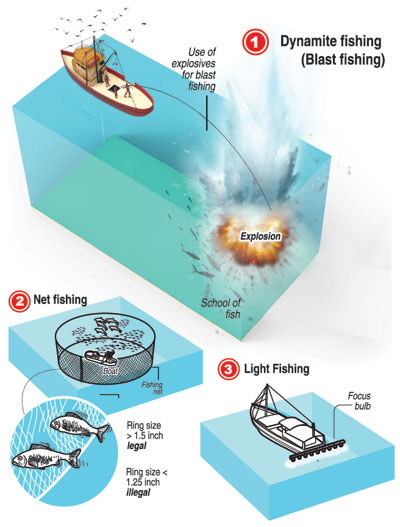News
Illegal fishing methods continue to deplete resources, traditional fisherfolk severely affected
View(s):By S Rubatheesan
If you look at the sea off Mullaithivu at midnight from the coast, you would see a border made of light sources – those are high powered focus lights submerged in the water to attract fish banks.
Using light sources for fishing activities is one of the 16 illegal fishing methods banned by the Fisheries Department as per the gazette notifications issued in 2016 detailing fisheries regulations.
Local fishermen in Mullaithivu allege that their sea has become a hot spot for various kinds of illegal fishing activities in the recent past where fishermen from Kokkilai, Pullmottai and Mannar engage in illegal fishing.

In light fishing, boats carry battery sources to dump high power focus lights under the sea to attract fish banks
On Monday night, Vanni District Parliamentarian T Raviharan boarded a local fishing boat to Mullaithivu sea to see what local fishermen were complaining about for several weeks. What he witnessed in the mid sea is something he had not seen anywhere.
“It looked like I was in the middle of Mullaithivu town – the region was lit up with power sources where light was illuminating from under sea,” MP Raviharan told the Sunday Times.
What he had witnessed is locally known as “light fishing”, an illegal fishing method in which boats carry power battery sources to dump high power focus lights under the sea to attract fish banks as a technique for better catch.
Other boats, according to Mr Raviharan, carried a series of light sources on top of their boats and they switched off one by one to lure fish banks.
“Local fishermen who engage in traditional fishing methods are severely affected due to this kind of illegal fishing activity. Unfortunately, respective regional Fisheries Department officials and Navy also turned a blind eye to them,” alleged the MP from Mullaithivu.
In Mannar, in addition to light fishing, ‘localized’ bottom trawling coupled with dynamite fishing activities have become a severe concern for traditional fishermen, who are at the receiving end of the consequences with their one time fishing grounds disappearing, forcing them to go deep sea to put food on the table.
Protesting against illegal fishing activities also comes with a price.
Vidathaltheevu West Fishermen Co-operative Society in Mannar was at the forefront of opposing any illegal fishing activities in their village, particularly light fishing activities in the area.
The fishermen’s union wrote to relevant authorities including regional Fisheries Inspector, Navy and Coastguard urging for immediate action in early July. On July 19, a boat belonging to the Treasurer of the union was burned and other fishing boats owned by others in the union were damaged by unknown persons.

Ponrasa Robert Baskaran, President of the Co-Operative society also saw his fishing boat was damaged and sunken in mid sea. At least four such incidents were reported after the society wrote a collective letter to authorities calling for strict measures against all types of illegal fishing activities.
“We have to protect the livelihood of our fishermen who mostly engage in coastal fishing activities with mini boats and vallams. They struggled to support their families as fish banks were destroyed in mid sea due to these activities,” the fishermen leader told the Sunday Times.
In Mannar, those using dynamite blast fishing dump abandoned fibre boats and bushes at mid sea near coral reefs in order to create an artificial sanctuary for fish banks to breed for a certain time.
The Global Positioning System (GPS) coordinates to track those locations are clearly marked by the tech savvy fisherfolk, and once they identify fisher banks have been established in the region, they will use dynamite to harvest them.
In 2016, the Fisheries Department imposed a ban on the use of destructive fishing methods known as ‘Laila’ and ‘Surukku’ where nets with smaller rings are frequently used to catch smaller fish varieties.
The Surukku net with small rings is popular among fisher folk in Mannar, Mullaithivu and Negombo. They use this net equipped with light to catch fish at night. Those who violate the ban will be slapped with fines of up to Rs 50,000.
Last month the Ministry of Fisheries, Aquatic and Ocean Resources launched an extensive, joint programme to curb illegal fishing saying “it has become a serious threat to the ocean resources of Sri Lanka and the sustainability of the fishing industry.”
A special discussion, chaired by Minister Ramalingam Chandrasekar, was attended by Members of Parliament Ajith Gihan, Stepni Fernando, and Roshan Akmeemana representing the coastal districts, as well as senior officials from the Sri Lanka Navy, Department of Coast Guard, Department of Fisheries, NARA and Sri Lanka’s Controller of Explosives.
“We must put an end to the process of destroying our maritime borders, fishing communities and the entire ocean resources using illegal gear. The damage caused by the use of lights, Laila, purse seines and explosives is immense. If this situation continues, our future generations will be left with only a sea desert. We have taken these tough decisions to secure the future of the fishing industry and the fishing community,” Minister Chandrasekar was quoted as saying in a statement issued by the ministry.
At the meeting, it was decided to set up Joint District Coordination Committees covering all 15 coastal districts, comprising the Navy, Police, Coast Guard, Department of Fisheries and Aquatic Resources and representatives of the fishing community to identify and prepare formal plans to curb illegal activities unique to each district.
At the grassroots level, ecological impact due to illegal fishing resulting in depletion of fisheries resources are becoming a reality.
Edison Marynathan, an environmentalist based in Mannar told the Sunday Times that what certain ‘profit focused’ fisherfolk who engage in illegal fishing activities failed to understand is that there will be no fisheries resources left for future generations if these activities go unchecked.
“They are purely focused on making money at any expense. Or else why would anyone use dynamite near coral reefs where fish banks gather during seasonal changes?” asked Edison.
The best way to say that you found the home of your dreams is by finding it on Hitad.lk. We have listings for apartments for sale or rent in Sri Lanka, no matter what locale you're looking for! Whether you live in Colombo, Galle, Kandy, Matara, Jaffna and more - we've got them all!

